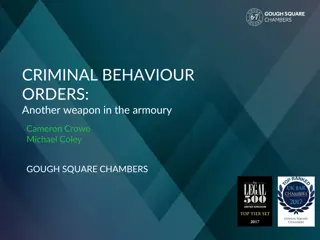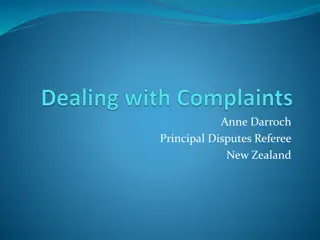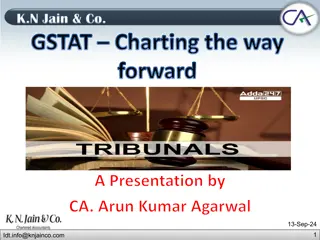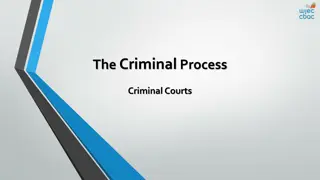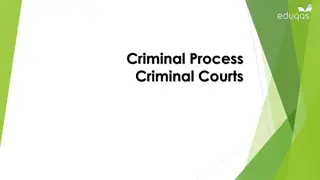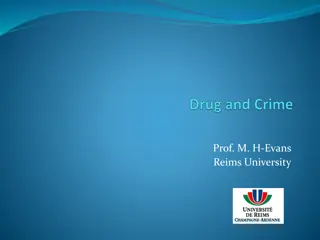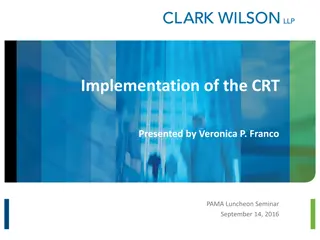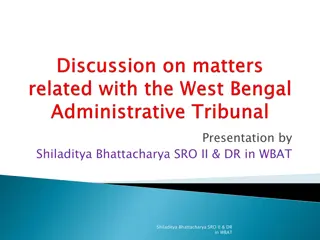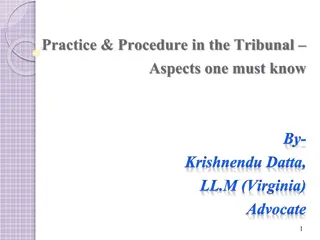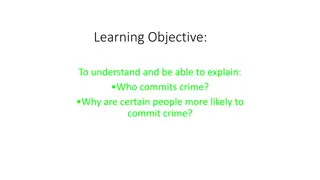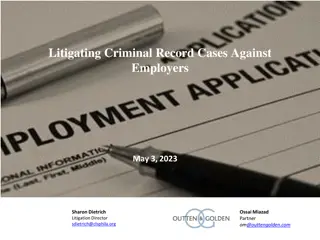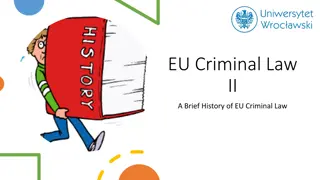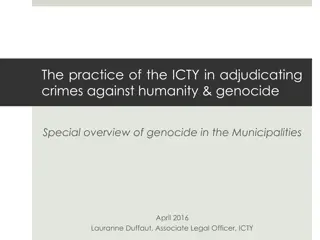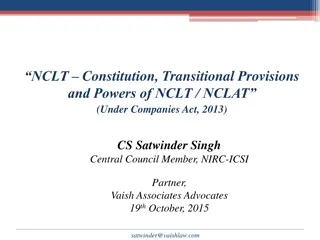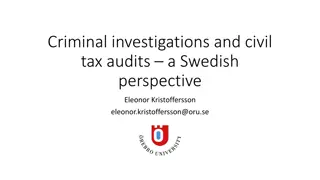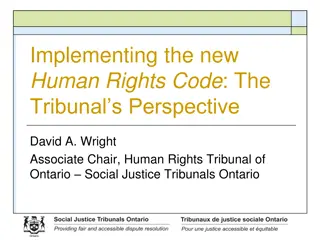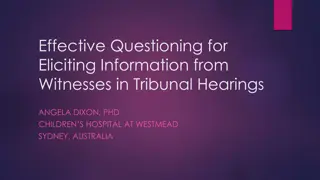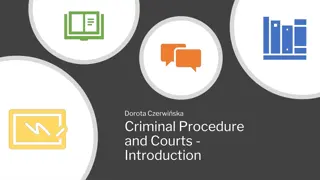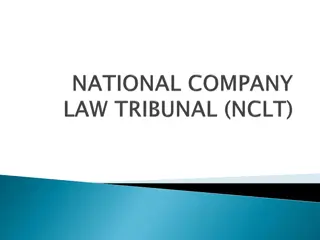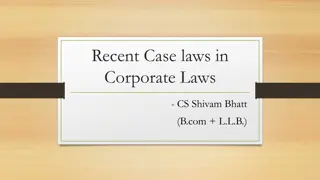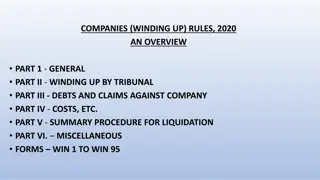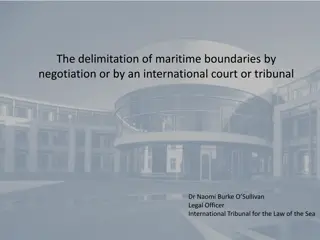United Nations Survey on Crime Trends and Operations of Criminal Justice Systems
The United Nations Survey on Crime Trends and Operations of Criminal Justice Systems (UN-CTS) focuses on harmonizing data collection, identifying crime patterns, improving monitoring of the criminal justice system, and enhancing international comparability of crime statistics. It was mandated by the
3 views • 18 slides
Harmonisation of Substantive Criminal Law in the EU
The Treaty of Lisbon serves as a legal foundation for the harmonisation of substantive criminal law within the European Union. It establishes the basis for judicial cooperation, mutual recognition of judgments, and approximation of laws across Member States. The treaty allows for the establishment o
2 views • 60 slides
Understanding Criminal Behavior from a Social Psychological Perspective
This unit delves into the application of social psychology in the legal system, exploring the nature of criminal behavior, responses to criminal acts, the criminal justice system, and rehabilitation. It examines the social ecological perspective of criminal acts and outlines key points related to th
0 views • 50 slides
Understanding Psychological Theories of Criminal Behavior
Psychologically-based criminologists attribute criminal behavior to individual factors such as negative early childhood experiences and inadequate socialization, leading to criminal thinking patterns and incomplete cognitive development. Probation and parole practices are influenced by rehabilitatio
0 views • 30 slides
Understanding Criminal Law and Procedure: Greenvisor's Case
A case study involving embezzlement by Joe Greenvisor, the chief accountant of Nobreath Corporation, sheds light on criminal acts, duties, intent, and societal perspectives on crime. Despite Greenvisor's charitable intentions, his actions constituted a crime under the law. The elements of criminal a
0 views • 47 slides
Understanding Criminal Offences: A Comparative Analysis
Exploring the concept of criminal offences, this article delves into the definitions in common law and continental law systems. It discusses the structural elements, harmful nature, prohibition, punishment, and distinctive aspects of criminal acts. A comparison between common law and continental law
1 views • 33 slides
Understanding the Process of Sealing Criminal Records
Having a criminal record sealed means making it inaccessible to the public while keeping it available to criminal justice agencies. Eligibility for sealing records requires taking action, and not everyone qualifies. This clinic provides guidance on the sealing process and the types of records that c
0 views • 36 slides
Understanding the Roles in Criminal Justice System
The criminal justice system involves three branches of government, each with specific responsibilities, operating at federal, state, and local levels. Law enforcement is primarily a local government function, while legislatures determine criminal laws and punishments. Statutes organized into codes d
0 views • 35 slides
Understanding Substantive Criminal Law in the American Legal System
Substantive criminal law encompasses the definition of criminal acts and penalties, with a core principle being that there can be no crime without a corresponding law. The American legal system follows the Rule of Law, ensuring that all individuals are subject to legal governance. Constitutional lim
0 views • 22 slides
Strategies for Effective Tribunal Advocacy in Employment Cases
Practical guidance on preparing for and presenting a case at an Employment Tribunal, covering disputed legal and factual issues, persuasion tactics, witness preparation, dealing with opposing witnesses, hearing procedures, and effective questioning techniques, all illustrated with images for better
0 views • 17 slides
Confiscation in the Criminal Courts: A Guide to Proceeds of Crime Law
Confiscation in the criminal courts involves depriving defendants of benefits gained from criminal conduct within their means. The Proceeds of Crime Law in the Cayman Islands sets guidelines for these proceedings, emphasizing that confiscation is not a form of punishment but aims to recover obtained
3 views • 17 slides
Understanding the Process of Sealing Criminal Records
Sealing criminal records means restricting public access to the records, although they are not destroyed and remain accessible to certain entities. Eligibility requirements vary, and action must be taken to seal records. This presentation covers the process, eligibility criteria, and what to expect
1 views • 36 slides
Understanding Civil and Criminal Complaints in Legal Cases
Explore the distinctions between civil and criminal complaints in legal scenarios. Learn how a civil case seeks monetary damages while a criminal case pursues punishment for wrongful actions. Understand the roles of plaintiffs and prosecutors, burden of proof, and outcomes in both civil and criminal
0 views • 34 slides
Briefing on the Criminal Procedure Amendment Bill [B12-2021] to the Portfolio Committee on Justice and Correctional Services
The Criminal Procedure Amendment Bill aims to address the constitutional invalidity of section 154(3) of the Criminal Procedure Act by enhancing protection for child victims, accused, and witnesses in criminal proceedings. The Bill proposes prohibiting the publication of information revealing their
0 views • 12 slides
Understanding Criminal Behaviour Orders: An Overview and Legal Requirements
Criminal Behaviour Orders (CBOs) are issued following conviction for criminal offences to tackle serious and persistent anti-social behavior. This talk provides an overview of CBOs, legal requirements, when they are appropriate, and practical tips for implementation. The orders can prohibit or requi
0 views • 12 slides
Judicial Processes and Misconduct in New Zealand Disputes Tribunal
The New Zealand Disputes Tribunal, led by Principal Referee Anne Darroch, handles civil claims up to $15,000 or $20,000 by consent, with over 60 referees managing 16,000-20,000 claims yearly. Limited appeal rights are in place, with a complaints mechanism under process for all New Zealand Tribunals
0 views • 22 slides
Understanding GSTAT - A Comprehensive Overview of Goods and Services Tax Appellate Tribunal
Explore the key aspects of the Goods and Services Tax Appellate Tribunal (GSTAT) including its constitution, procedures, and significance in the realm of taxation. Learn about the stages of litigation, the role of GSTAT in appeals, and essential tips for effective appeal presentations. Discover the
0 views • 37 slides
Asset Recovery Practices in England and Wales: Criminal vs. Civil Proceedings
Asset recovery in England and Wales involves a combination of criminal and civil proceedings to secure justice and return funds to victims of crime. The CPS's Proceeds of Crime Division plays a crucial role in obtaining Restraint Orders and Confiscation Orders. Civil recovery, focusing on illicit fi
0 views • 11 slides
Understanding the Criminal Justice System in Court Proceedings
This content explores various aspects of the criminal justice system, including the adversarial system, classification of offenses, criminal court systems, trial procedures, plea bargaining, and more. It covers models of criminal justice systems, classification of offenses, modes of trial, sending f
0 views • 15 slides
Overview of the Criminal Justice System
Exploring the complexities of the criminal justice system, this content delves into the adversarial system, classification of offenses, criminal court system, modes of trial, plea bargaining, trial procedures, and various criminal process models.
0 views • 15 slides
Employment Law Cases Update: Disability Discrimination - February 2017
Private Medicine Intermediaries Ltd v. Hodkinson involved a case of constructive unfair dismissal and harassment due to a disabled employee being pressured to work long hours. The Employment Appeal Tribunal ruled that the expectation for the employee to work long hours constituted a discriminatory p
0 views • 16 slides
The Statistical Association Between Substance Misuse and Criminal Behavior
This brief synthesis discusses the statistical association between substance misuse (specifically drugs and alcohol) and criminal behavior. It draws upon meta-analyses investigating the links between drug use and crime, as well as alcohol consumption and violent behavior. Various theories are explor
0 views • 12 slides
Evolution of Criminal Law and Thought: From Pre-Classical Era to Enlightenment
Explore the progression of criminal law and thought from the Pre-Classical School of Thought to the Enlightenment era. Delve into concepts like folkways, mores, and the origins of criminal law, including examples such as societal norms, dress codes, and supernatural explanations for behaviors during
0 views • 23 slides
Understanding the Civil Resolution Tribunal (CRT)
Civil Resolution Tribunal (CRT) is introduced as a place to resolve strata-related disputes in an accessible, speedy, and economical manner. It aims to encourage agreement between parties or decide claims. CRT's mandate includes providing fair dispute resolution services using electronic tools. The
0 views • 38 slides
Overview of Administrative Tribunal Proceedings in WBAT
Administrative Tribunal proceedings in WBAT are governed by Article 323A of the Constitution. The tribunal is headed by a Chairman, with benches comprising a Judicial Member and an Administrative Member. Cases are either contested by advocates or departmental representatives. Specific procedures are
0 views • 19 slides
Key Aspects of Practice & Procedure in Tribunals for Advocates
This informative content by Krishnendu Datta, LL.M. (Virginia) Advocate covers essential aspects of practice and procedure in tribunals. It discusses concise narration of material facts, specific instances of oppression and mismanagement, interim and final reliefs, powers of the tribunal under Secti
0 views • 13 slides
Exploring the Factors Behind Criminal Behavior
Understanding who commits crime and why certain individuals are more likely to engage in criminal activities involves exploring a range of social and biological factors. While biology suggests a genetic predisposition to criminal behavior, sociology emphasizes the influence of social factors like fa
0 views • 9 slides
Understanding Title VII and Criminal Records in Employment Discrimination Cases
This presentation delves into the intersection of Title VII and criminal records in employment discrimination cases. It covers the lack of specific protections for individuals with criminal records under Title VII, the implications of disparate impact cases, and the development of standards in the c
0 views • 15 slides
Evolution of EU Criminal Law Through Cooperation and Commitment
The history of EU criminal law traces back to the Treaty of Rome in 1957 when the EU initially focused on economic matters. Over the years, with the judgment in the Stauder case in 1969 and the formation of the TREVI group in the 1970s, cooperation on security and combating terrorism laid the founda
0 views • 59 slides
Overview of ICTY's Adjudication of Crimes Against Humanity and Genocide
Explore the significant role of the International Criminal Tribunal for the former Yugoslavia (ICTY) in adjudicating crimes against humanity and genocide, focusing on the history, international crimes, specific trials, and achievements in bringing perpetrators to justice. The presentation provides i
0 views • 27 slides
Evolution of NCLT and NCLAT Under Companies Act, 2013
The establishment and constitutional validity of the National Company Law Tribunal (NCLT) and National Company Law Appellate Tribunal (NCLAT) under the Companies Act, 2013 were upheld in a landmark judgment by the Supreme Court. The NCLT marks a new era in corporate adjudication, taking over jurisdi
0 views • 41 slides
Understanding the Interaction Between Criminal Investigations and Civil Tax Audits in Sweden
The relationship between criminal investigations and civil tax audits in Sweden is explored, highlighting how tax audits and criminal proceedings run concurrently. The mens rea requirement for criminal sanctions and tax surcharge, as well as the integration between criminal sanctions and tax surchar
0 views • 13 slides
Insights into Implementing Human Rights Code: Tribunal's Perspective
Providing valuable insights from the Human Rights Tribunal of Ontario's Associate Chair, David A. Wright, this presentation delves into key principles of the dispute resolution model, challenges faced, adaptations made, and future considerations. It highlights statistics, social areas, grounds for a
0 views • 35 slides
Effective Questioning Techniques in Tribunal Hearings
Effective questioning techniques are crucial in tribunal hearings to elicit accurate information from witnesses. Angela Dixon, Ph.D., emphasizes the importance of asking the right questions to engage participants and achieve optimal outcomes. Communication barriers, competency areas, and strategies
0 views • 32 slides
Fundamentals of Criminal Law and Procedure
Explore the key aspects of criminal law and procedure, including definitions of crime, the role of criminal procedure, sources of law, phases of the criminal process, participants involved, and rules of evidence in legal proceedings. Gain insight into how criminal law is distinct from civil law and
0 views • 24 slides
National Company Law Tribunal and Appellate Tribunal Definitions and Membership Criteria
The content outlines the definitions and membership criteria for the National Company Law Tribunal and Appellate Tribunal in detail. It covers the qualifications required for Judicial Members, Technical Members, and the President, as well as the selection process and powers conferred by the Central
0 views • 18 slides
Recent Case Laws in Corporate Laws - Economy Hotels India Services Pvt. Ltd. v. Registrar of Companies & ANR. (NCLAT)
In this case, Economy Hotels India Services Pvt. Ltd. filed a petition under Section 66 of the Companies Act for confirming the reduction of share capital. The National Company Law Tribunal (NCLT) rejected the application, but the National Company Law Appellate Tribunal (NCLAT) allowed the reduction
0 views • 21 slides
Companies (Winding Up) Rules, 2020: An Overview
The Companies (Winding Up) Rules, 2020 provide guidelines for winding up a company by the Tribunal under the Companies Act, 2013. The rules cover various aspects such as modes of winding up, circumstances under which a company may be wound up by the Tribunal, definitions, forms, and more. It specifi
1 views • 110 slides
Delimitation of Maritime Boundaries by Negotiation or International Courts
Delimitation of maritime boundaries can be achieved through negotiation or by international courts or tribunals. Maritime boundary agreements have legal effects and obligations for the involved states. International bodies like the International Court of Justice and the International Tribunal for th
0 views • 5 slides
Overview of Oppression and Mismanagement Provisions under Companies Act, 2013
This content provides detailed information about the provisions related to oppression and mismanagement as per the Companies Act, 2013. It outlines the eligibility criteria for members of shareholders to raise concerns, the power of the tribunal to intervene, and the possible orders that can be pass
0 views • 6 slides




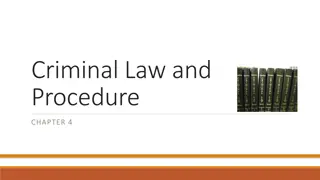
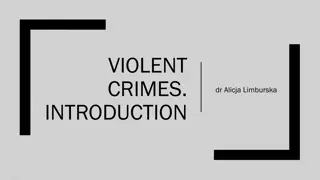

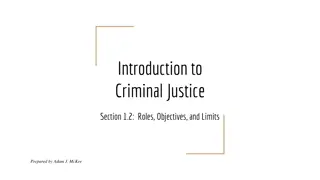
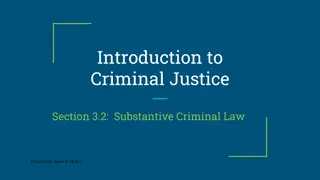
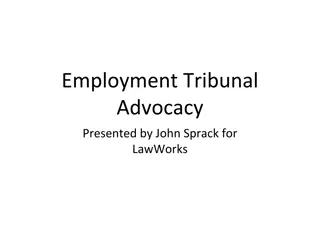
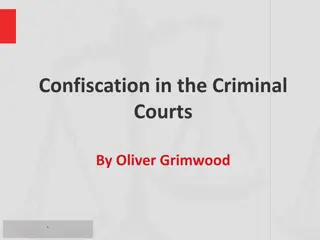

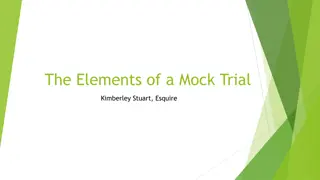
![Briefing on the Criminal Procedure Amendment Bill [B12-2021] to the Portfolio Committee on Justice and Correctional Services](/thumb/157093/briefing-on-the-criminal-procedure-amendment-bill-b12-2021-to-the-portfolio-committee-on-justice-and-correctional-services.jpg)
